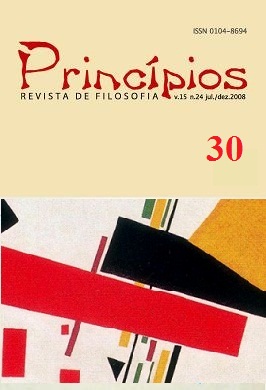La concepción intelectual de lo divino como coincidentia oppositorum a la luz de lo maximum et minimum absolutum en el pensamiento de Nicolás de Cusa
Palavras-chave:
docta ignorantia, coincidentia oppositorum, maximum et minimum absolutum, discurso teológico, nomes inefáveisResumo
On February 12, 1440 Nicholas of Cusa (1401-1464) concludes in his birthplace of Kues drafting the first major systematic formulation of his thinking: De docta ignorantia. The main category of his metaphysics in this context, i.e. the maximum, is analyzed and interpreted by him on three considerations: the maximum in an absolute sense, as contracted and finally as absolute and contracted, at the same time. In the context of the First Book, which presents the singular methodology of the docta ignorantia, considers the maximum in itself in light of the paradoxical concept of coincidentia oppositorum in the absolute. In the final chapters of this first book tackles the critical of the theological discourse and thus, the problem of the ineffable name of maximum et minimum absolutum. Hence the purpose of this work is the further on cusan’s evaluation of language problem as it shows through treatment of the theological discourses and divine names that emerge from them, in light of the way of docta ignorantia.Downloads
Não há dados estatísticos.
Downloads
Publicado
02-04-2012
Como Citar
RIOS, José González. La concepción intelectual de lo divino como coincidentia oppositorum a la luz de lo maximum et minimum absolutum en el pensamiento de Nicolás de Cusa. Princípios: Revista de Filosofia (UFRN), [S. l.], v. 18, n. 30, p. 27–52, 2012. Disponível em: https://periodicos.ufrn.br/principios/article/view/1714. Acesso em: 25 fev. 2026.
Edição
Seção
Artigos
Licença
Autores mantêm os direitos autorais e concedem à revista o direito de primeira publicação, com o trabalho simultaneamente licenciado sob a Licença Creative Commons Attribution que permite o compartilhamento do trabalho com reconhecimento da autoria e publicação inicial nesta revista.
Termos da licença:
| Não Comercial (NC) | Os licenciados podem copiar, distribuir, exibir e executar a obra e fazer trabalhos derivados dela, desde que sejam para fins não comerciais. |
| Compartilha Igual (SA) | Os licenciados devem distribuir obras derivadas somente sob uma licença idêntica à que governa a obra original ou menos restritiva. |


 Português (Brasil)
Português (Brasil) English
English Español (España)
Español (España) Français (Canada)
Français (Canada)


